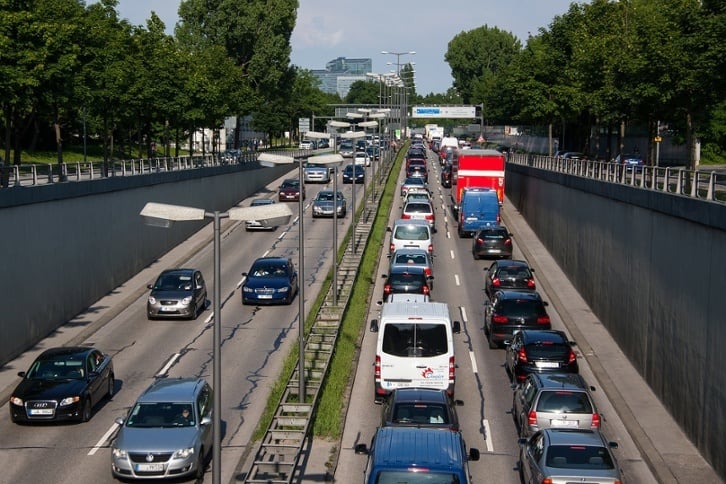
I decided to write this post after attending a lecture delivered by professor Julia King, hosted by the EPA in the Mansion house in Dublin on the 1st of February. The lecture was titled “Technologies for Sustainable Transport”.
One of the recurring themes of the talk was that in order to achieve the objectives set out for carbon emissions by 2050, REALLY big changes need to take place.
In summary, we need reduce our transport emissions by half; the main challenges in meeting this are as follows:
- The number of vehicles is increasing rapidly
- Annual distance driven is increasing every year (there may be a slight dip now due to recession, but the curve is definitely upwards)
- Some of the key transport areas that require focus are proving difficult to show worthwhile reductions, for example commercial transportation and haulage.
Having set out these challenges, Julia presented private car transport as one of the main areas which we can certainly improve, in fact to reach our targets, we effectively need a 90% improvement in this area. Julia stated that whilst small changes do combine to make a difference, we really need to make the big changes – and a 90% reduction in emissions will certainly require considerable adjustments.
I thoroughly enjoyed Julia’s lecture and I had the opportunity to ask her a question in the Q&A session at the end. My question was something along the following lines:
“Julia, thank you for the lecture, I found it interesting, etc..., I work in the GPS tracking industry, we work with commercial vehicles and businesses and organisations with fleets, however in my opinion, GPS tracking, provides the platform to launch a whole range of initiatives to reduce the mileage of private vehicles. The barrier is not the technology, it is the perceived violation of privacy, due to recording peoples driving activity. What have been your findings in this area?”
Julia’s answer was roughly as follows:
- I agree, there are many opportunities that this technology can offer
- Governments are reluctant to put forward proposals as it is a sensitive topic
- There are always people for and against new initiatives, for example when the congestion charge was introduced in London, the residents(Julia lives there) in the area were delighted and it freed up the streets and meant dramatically less traffic and road congestion. Local shop keepers, however, were not happy, due to a decrease in footfall in their shops.
So, what happens from here? There are advantages available, which could have a significant impact (maybe a 30% reduction according to my back of an envelope calculation) however there seems to be considerable resistance to this idea.
I would like to address the question of why exactly this is such a sensitive issue in generating some discussion and discover if this is something that could help us reduce our carbon emissions or is it just too controversial.
So what I am going to layout in the rest of this post is as follows:
- A brief history of activity in this area, current and past schemes in place
- Some of the potential initiatives that I think could work
- Arguments against – Privacy
- Arguments against – Cost
Explanation of the back ground of this area:
Pay as you drive insurance:
In terms of actually implementing the technology, there have been a number of pay as you go schemes that led the way and developed the profile of this form of insurance. Progressive Insurance in the USA, Norwich Union in the UK and even AXA insurance here in Ireland have run GPS insurance based schemes in the past. None of these schemes achieved great success, however there is a new generation of offerings available running on more cost effective and reliable hardware and pay as you drive insurance is again gaining traction in Europe.
Heavy Goods Vehicles:
There are also a number of government lead scheme running that use data from GPS recording devices to calculate road tax / tolls. The biggest of these schemes occurs in Germany, where all HGV’s must have a device fitted. There is also a similar scheme in the Czech Republic.
Past/Present proposals to track all vehicles
There have also been proposals put forward in the following countries, but as yet have not been implemented:
- Brazil – primarily to reduce car theft (15% of vehicles in the country are stolen) here is some detail on this from BBC news http://news.bbc.co.uk/2/hi/technology/7792469.stm
- Netherlands – Are close to implementing a scheme to tax vehicles based on distance driven, it is supposed to be in place in 2012, but there is still some opposition to the plan. The Dutch Transport Ministry are proposing to scrap vehicle registration and the 25% sales tax on cars, and in return they will charge drivers 3 cent per kilometre. The Dutch transport ministry believes that the majority (60%) of drivers will pay less tax than they currently do.
- USA, State of Oregon – Proposed a scheme to tax based on distance driven, however it came up against a lot of local opposition due to privacy concerns, and the fear that taxes would increase. The proposition has not been passed, however it was to be an optional scheme, with motorist not equipped with the tracking devices the standard gas tax would be raised 2 cents.
In my opinion looking at the scheme as purely a tax generating device based on distance driven is really selling short the capabilities of the technology. We could do a lot more with it, I would like to know a little bit more on the scope of the projects in Brazil, the Netherlands and in Oregon in the US. I haven’t been able to find any information regarding the possibility to extend the functionality beyond a simple tax per mile/kilometre based system. If it is just for tax based on distance, what is the point, there is already loads of tax on fuel, so we are already paying tax on distance. I think there is an opportunity to shape the way we think and use vehicles more responsibly, we have to do this if we want to achieve 90% carbon emission reductions.
Possible initiatives that would have a significant impact:
As discussed previously, I think there is a huge amount more to be gained than just a plain tax per mile/km system. Below are some of the things I think could work:
Provision of very accurate traffic data:
Already some services provided by Tom Tom, Inrix, Itraffic, Navteq. All of these systems are taking data from probes, it’s mostly data from mobile phones and data from commercial vehicles with GPS tracking devices installed. This type of data is referred to as anonymous floating point data, it is anonymous as they know there is a phone in the area, but they would not know who actually owns the phone, that data would be kept by the mobile operator. If every vehicle was fitted with a tracking device, this data would be more accurate and provide really accurate traffic data. This will be a big help to next generation “connected navigation” sat nav devices and to traffic information services like AA roadwatch etc.
Very accurate congestion charging:
I think this could really be one of the biggest areas of potential to change how we use cars. The congestion charge in London, most people I have spoken to, regard the charge as a great success. However I think it might be difficult / cost prohibitive to implement this in smaller cities. If every car was GPS tracked, this becomes really simple. Obviously the quality of public transport in London is another factor which makes the scheme feasible. At present it would not work in Dublin due to the lack of sufficient transport alternatives, unless we got creative.
*Idea* What about converting some of our Nama Land (land bought by developers that now will not likely be turned into houses/apartments for a very long time) into park and ride locations. These could be serviced by buses into the city centre. The fees generated by the congestion charges could go towards running these additional buses and also putting aside some savings for an underground (or maybe this would be an alternative to an underground). In reality this scheme could be equally set up for any city. It is a simple idea really. There would be park and ride sites surrounding the city, with a quality shuttle bus service operating from these sites.
Enforce speed limits:
GPS tracking on all vehicles, if used correctly, would essentially eliminate speeding instantly. In my opinion, this is really worth considering. The only driving hazards remaining would be driving under the influence and driver fatigue. Both of these areas could also be improved by charging vehicles more if they drive at night or penalise drivers for going over the legal driving times (legal limits are you must take at least a 15 minute break after 4 hours driving and you can’t drive more than 40 hours in a week)
Hook in with insurance:
An additional incentive for people to drive safely would be to provide them with an option to release their data to their insurer. That would mean you only pay insurance for what you drive. This will definitely help reduce mileage when compared to the “all you can eat” unrestricted driving model.
Car sharing schemes:
There are a number of car sharing schemes starting to appear, most of these already have GPS technology built in, however, if all vehicles were tracked, and people had the ability to opt in to a higher level of data sharing – then I think there would be a range of options to improve things like car pooling, car clubs etc.
Against: Privacy
Obviously the major concern that people voice is privacy when talking about this subject. Whilst I can understand the concerns, I think the argument is almost redundant. Anyone who has watched any kind of Police / Detective show recently will know that it is possible to work out reasonably easily where you have been if you have a mobile phone. Triangulation from mast towers means, that in theory, there is already one system tracking our movements.
It seems as though this technology is managed pretty responsibly by the data commissioners and the mobile phone operators and hence there are no complaints about it.
Against: Cost
So it is going to cost something to do this, perhaps as much as a couple of hundred euro per vehicle to get the kit installed (I think it would be lower if it was being done in the volumes required to track every vehicle).
At the moment without any incentives in place it is difficult to justify any additional cost, however reducing the distance we drive does have a value. So it needs some further investigation.
It is also important to look at costs from the various perspectives:
- Government – Certainly in Ireland they need every penny they generate from road and fuel tax at the moment, so any scheme will be structured not around reducing the tax collected but moving it around to try and make people seriously re consider how the use a vehicle
- Public – Nobody wants to pay more, and without the proper structure in place – ie. no realistic transport alternatives for people other than their car, they will be burnt on additional taxes and congestion charges. The support structures must be delivered hand in hand with the new way of calculating fees to be paid.
In summary, I am hoping to generate some discussion on this. I am also including a poll, to try and gauge the mood this area.
Photo by Dylan Gillis on Unsplash




